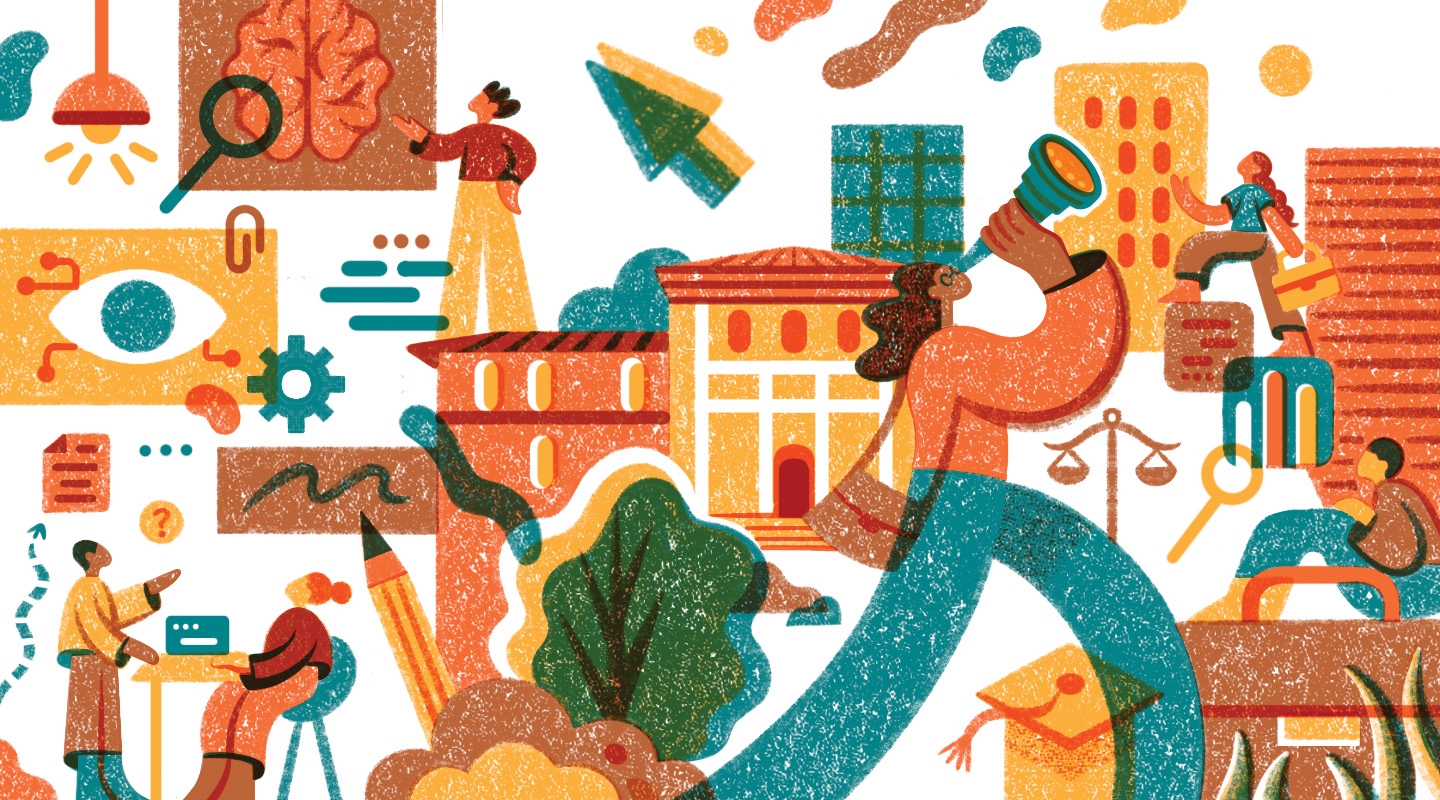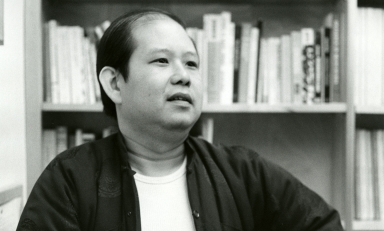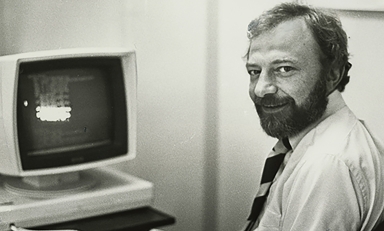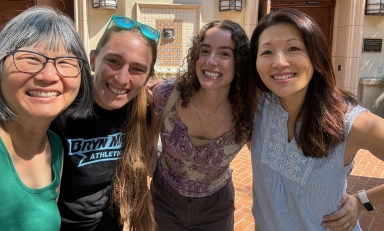From artificial intelligence in the classroom to immigrant rights in the city, the Occidental landscape has been abuzz with activity for faculty and students alike
Animator, designer, and director Amanda Tasse has been using generative AI in her work for the last couple of years. When she heard about a summer-long faculty learning initiative devoted to incorporating AI into the Oxy curriculum, she wanted to do a deeper dive.
“Coming at it as an artist and filmmaker, it’s very much about identifying in a practical way how to collaborate with AI at different stages of my process and the ethical implications of it,” says Tasse, who teaches hands-on classes in emerging media as an assistant professor of media arts and culture (MAC).
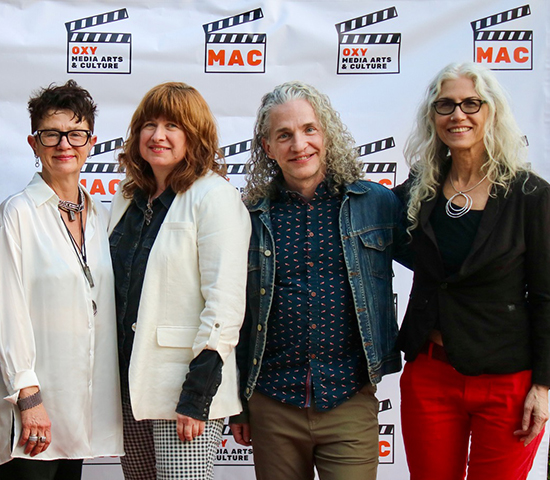
Tasse and her MAC colleagues Broderick Fox and Allison de Fren are among a select number of faculty members across multiple disciplines who are spending part of their summer in the classroom as participants in Oxy’s inaugural Academic Innovation Project, led by the Center for Teaching Excellence (CTE).
The initiative, underwritten by Linda and Tod White ’59, will give professors the opportunity “to collaborate, connect, and bounce ideas off one another” around a topic of utmost importance to instruction and the classroom experience, according to outgoing CTE Director and Professor of Cognitive Science Carmel Levitan, who’s overseeing the summer cohort.
In selecting a variety of proposals—from cognitive science and philosophy to diplomacy and world affairs and urban and environmental policy—the project was designed to bring together a group of faculty with very different takes on the impact of AI, including how it can impact students’ critical thinking. “Even the most pro-AI person is thinking about what the downsides are,” Levitan says. “Even people who hate it recognize that our students are going to get jobs in a world where AI exists.”
Fox, the James Irvine Professor of Media Arts and Culture and a documentary filmmaker, wants to examine AI on multiple levels. “Instead of sitting idly by as consumers, we have a unique opportunity in our department to make AI an object of study—critically and creatively questioning these technologies and riding the AI wave, rather than being bowled over by it,” he says.
For her part, de Fren—who teaches both critical media and hybrid media theory-practice courses, such as The Video Essay—has been examining what AI means for the future of critical scholarship and writing.
“The essay has long been a cornerstone of liberal arts education and the principal vehicle through which we’ve taught students to engage in scholarly research, critical thinking, and writing,” she notes. “When does generative AI support learning, and when does it short-circuit the kind of idea cultivation and rhetorical engagement that writing fosters? How can faculty help students develop AI literacy—not simply how to use these tools, but how to make thoughtful, ethical decisions about what can and what should not be delegated to them? These are some of the questions I’ve been exploring.”
As an expert on Ancient Greek and 20th-century European and Eastern European philosophy, Julia Sushytska, resident associate professor in comparative studies in literature and culture, has been exploring the ways in which using AI can extend students’ thinking. She’s using the project to develop the curriculum for a course she’ll teach next spring titled Becoming Human: Deleuze, Chekhov, and the Possibility of New Futures.
“It’s critical for young people to become aware of how exactly and by whom this technology is designed, because it could be used by some humans to harm human and other living beings,” Sushytska says. “The goal of my course is to help students envision the ways to neutralize the dangerous effects of AI. One of the assignments that I developed will ask students to expose biases of Gemini or ChatGPT and then think of an antidote that would neutralize this and other harmful effects of these technologies. That might be my most ambitious goal.”
Sushytska says that being involved in this project with her colleagues has been beneficial to her work. “I have these big abstract ideas, and they offer concrete feedback,” she notes. “It’s absolutely incredible because it shows how much more creative you can be when working together with other people. It helps you refine your ideas and acquire new ones in conversations with others. It’s a very powerful collaboration that’s happening across disciplines.”
In mid-August, the faculty will present their research to the broader faculty community, sharing what they worked on and what they got out of it. “I think everyone’s appreciating working together in community,” Levitan says. “It’s really resonating with what other people are finding and seeing. We can share resources and we don’t need to reinvent the wheel. We’re also seeing the commonalities of some of our concerns.”
Research and internships have long been part of the summer landscape at Occidental—and students have no shortage of opportunities to dive deeper into their academic interests when they could be at the beach (or the mountains—or the desert, for that matter).
This summer, approximately 160 students have been engaged in College-sponsored research under the supervision of more than 50 Oxy faculty. Those students were scheduled to share their experiences at the 2025 Summer Research Program Conference on July 30.
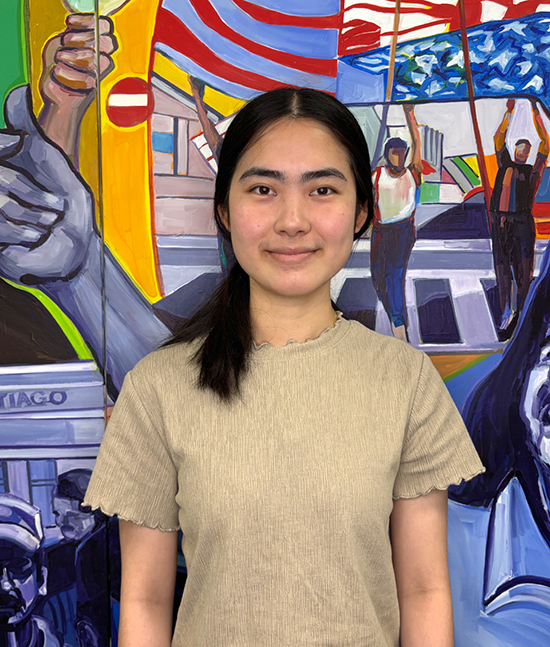
Among that number, this year’s cohort of eight Obama Scholars were engaged in 10 weeks of experiential learning and leadership training funded by the Barack Obama Scholars Program, a scholarship program launched in 2017 to empower the next generation of leaders to actively pursue the public good.
As part of the Justice Summer Internship program, Villathina “Thina” Ly ’27, a diplomacy and world affairs major from Cambodia, has been interning at the Coalition for Humane Immigrant Rights (CHIRLA), the Los Angeles-based organization led by Angélica Salas ’93 H’07 that advances the human and civil rights of immigrants and refugees. Ly has been collecting and verifying the data of the individuals CHIRLA assists, including those impacted by the ICE raids in Los Angeles.
Immigrant rights are extremely important to Ly, who grew up in Phnom Penh. “A lot of my fellow Cambodians migrated to other countries in hopes of a better life,” she says. “They received inhumane treatment from their employers in other countries. It made me feel dismayed. My hope is to pursue the public good by using diplomacy. I want my people to be viewed with equal dignity. That is my aspiration.”
Ly’s experience working at CHIRLA has helped her feel closer to her fellow Angelenos. “I feel like I’m in the thick of it, learning a lot,” she says. “CHIRLA is basically on the front lines. I get to see how they interact with people in crisis, and I think that’s valuable. It reinforces my value of trying to uphold human dignity.”
The internship also has given her a new perspective on working for a non-governmental organization after graduating. “Organizations like CHIRLA help asylum seekers get settled and back on their feet so they can work and contribute to the country,” she explains. “I was interested in helping address this from a government perspective. The work I’m doing with CHIRLA showed me I can also do it from a nongovernmental perspective. So I’m trying to answer the question of how both NGOs and the government can work together to address these issues.”
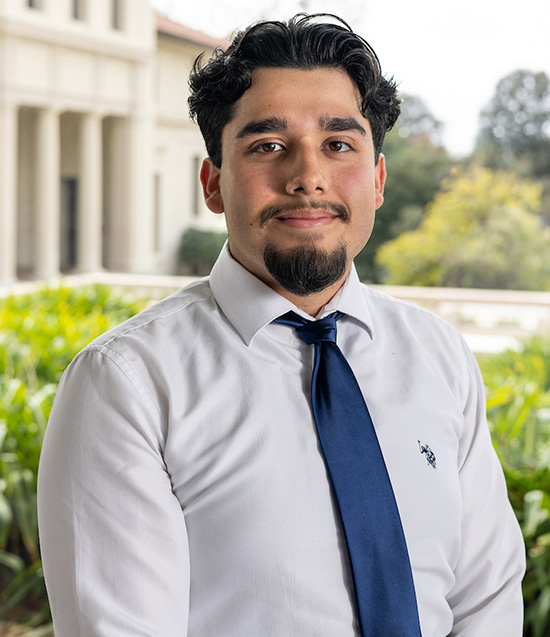
Fellow Obama Scholar Jose Bustamante Ortiz ’27, a computer science and economics major from East Los Angeles, shares a similar aim of supporting marginalized communities, but he is exploring doing so by leveraging technology and tailoring it to the specific needs of individuals.
For his summer internship, Bustamante Ortiz is working for SoCal tech company Bucket Labs to create a privatized AI model for small- to medium-sized companies and nonprofits to keep their data secure. “A lot of free services in tech are probably selling your data,” he notes. “When it comes to sensitive data, especially right now in L.A., you want to make sure these tools aren’t harming anybody. I think these tools are supposed to uplift and support marginalized groups and not attack them.”
Bustamante Ortiz is gaining new perspectives by working with people from all over the world at different stages in their careers. “I have coworkers from Nigeria, Mozambique, and Canada,” he says. “It feels like this huge melting pot where we’re able to share this combined goal of making tech to serve people who really need it.”
He’s also examining and helping solve for the environmental impact of using these technologies. “A lot of AI models are very heavy in the consumption of energy,” he points out. “I’m on the research and testing team, so I’m finding out what AI models are energy-efficient. We hope that by making them more efficient, we’ll only use what we need.”
Laura Ferriero wrote “Origin Stories” in the Fall 2024 magazine.

